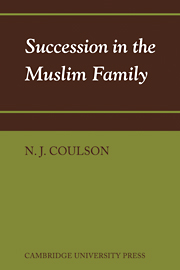Book contents
- Frontmatter
- Contents
- Introduction
- 1 Family ties as grounds of inheritance
- 2 Priorities in inheritance
- 3 Primary heirs
- 4 Substitute heirs
- 5 Secondary heirs
- 6 Grandfather and collaterals in competition
- 7 Succession by the outer family
- 8 Inheritance in Shīʻī law
- 9 Reforms in the traditional system of priorities
- 10 Dual relationships
- 11 Impediments to inheritance
- 12 Conditions of inheritance
- 13 Bequests
- 14 The limits of testamentary power
- 15 Death-sickness
- Index
- Frontmatter
- Contents
- Introduction
- 1 Family ties as grounds of inheritance
- 2 Priorities in inheritance
- 3 Primary heirs
- 4 Substitute heirs
- 5 Secondary heirs
- 6 Grandfather and collaterals in competition
- 7 Succession by the outer family
- 8 Inheritance in Shīʻī law
- 9 Reforms in the traditional system of priorities
- 10 Dual relationships
- 11 Impediments to inheritance
- 12 Conditions of inheritance
- 13 Bequests
- 14 The limits of testamentary power
- 15 Death-sickness
- Index
Summary
In any legal system of succession the fundamental consideration is the extent to which an individual has the personal right to determine the devolution of his property after his death. Such power was commonly denied in those early forms of society where the individual was wholly subordinate to the group. Instead, the law imposed compulsory rules of succession of general application; for the security of the group required that property should, on the decease of its owner, be transmitted in a foreseeable way to those held by the law as best entitled to it rather than to those whom the deceased might personally prefer. By contrast, most modern systems of succession rest firmly upon the freedom of the individual to determine the devolution of his property upon his decease. Under English law, for example, the wishes of the deceased as expressed in his will are paramount, and basically the law only intervenes to specify the manner in which the property shall devolve when a person has died wholly or partially intestate – that is to say, when he has not made a valid will, or when such testamentary dispositions as he has made do not exhaust the whole of his estate.
The general nature of the Islamic law of succession
It is from the way in which it resolves this fundamental question that the Islamic law of succession derives its most distinctive characteristics.
- Type
- Chapter
- Information
- Succession in the Muslim Family , pp. 1 - 9Publisher: Cambridge University PressPrint publication year: 1971



